Better Addiction Care Blogs
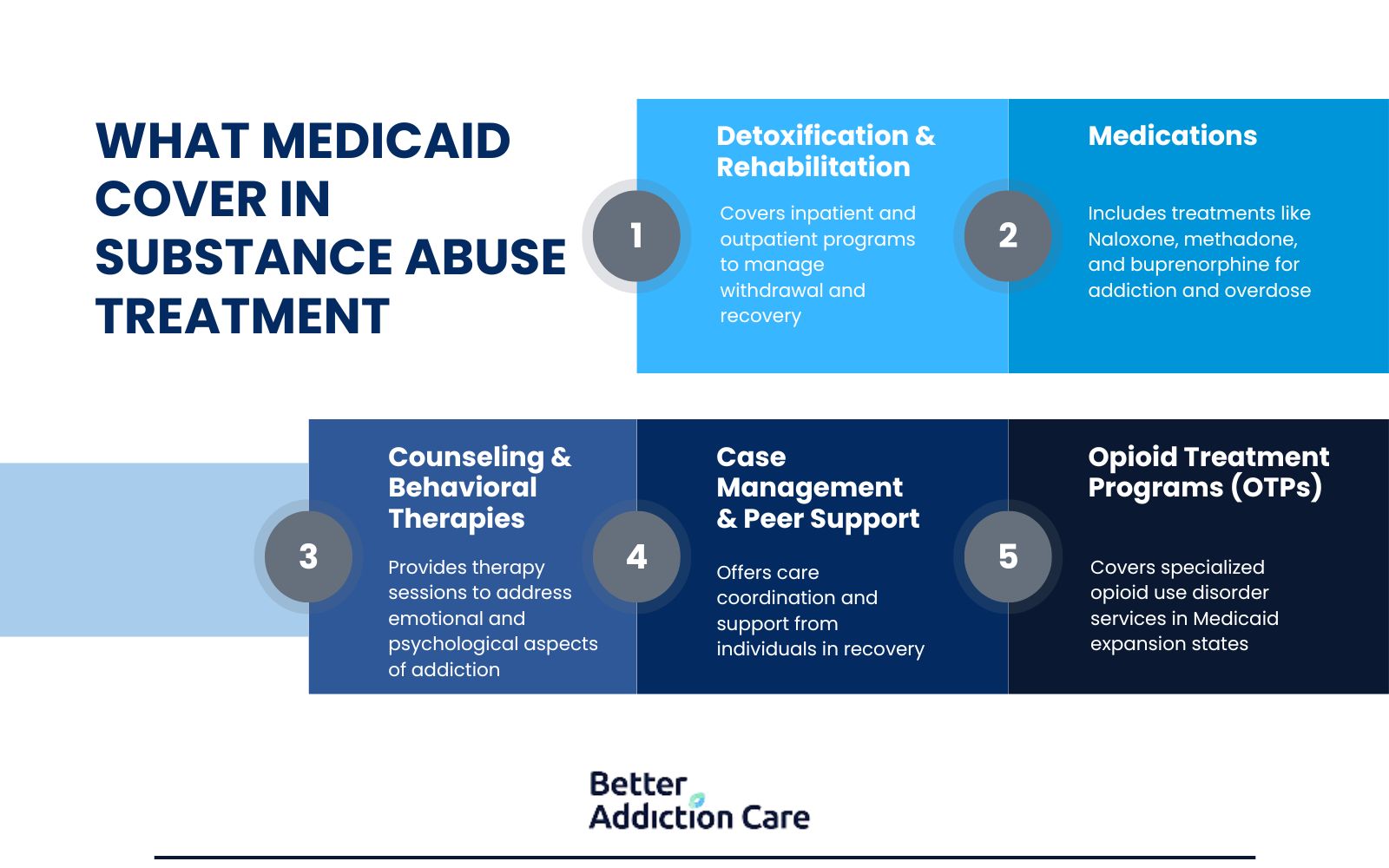
Medicaid is a government-funded health insurance program that provides access to essential healthcare services, including addiction treatment, to low-income individuals and families, with coverage varying by state.
Medicaid is a government-funded health insurance program that provides access to essential healthcare services, including addiction treatment, to low-income individuals and families, with coverage varying by state.
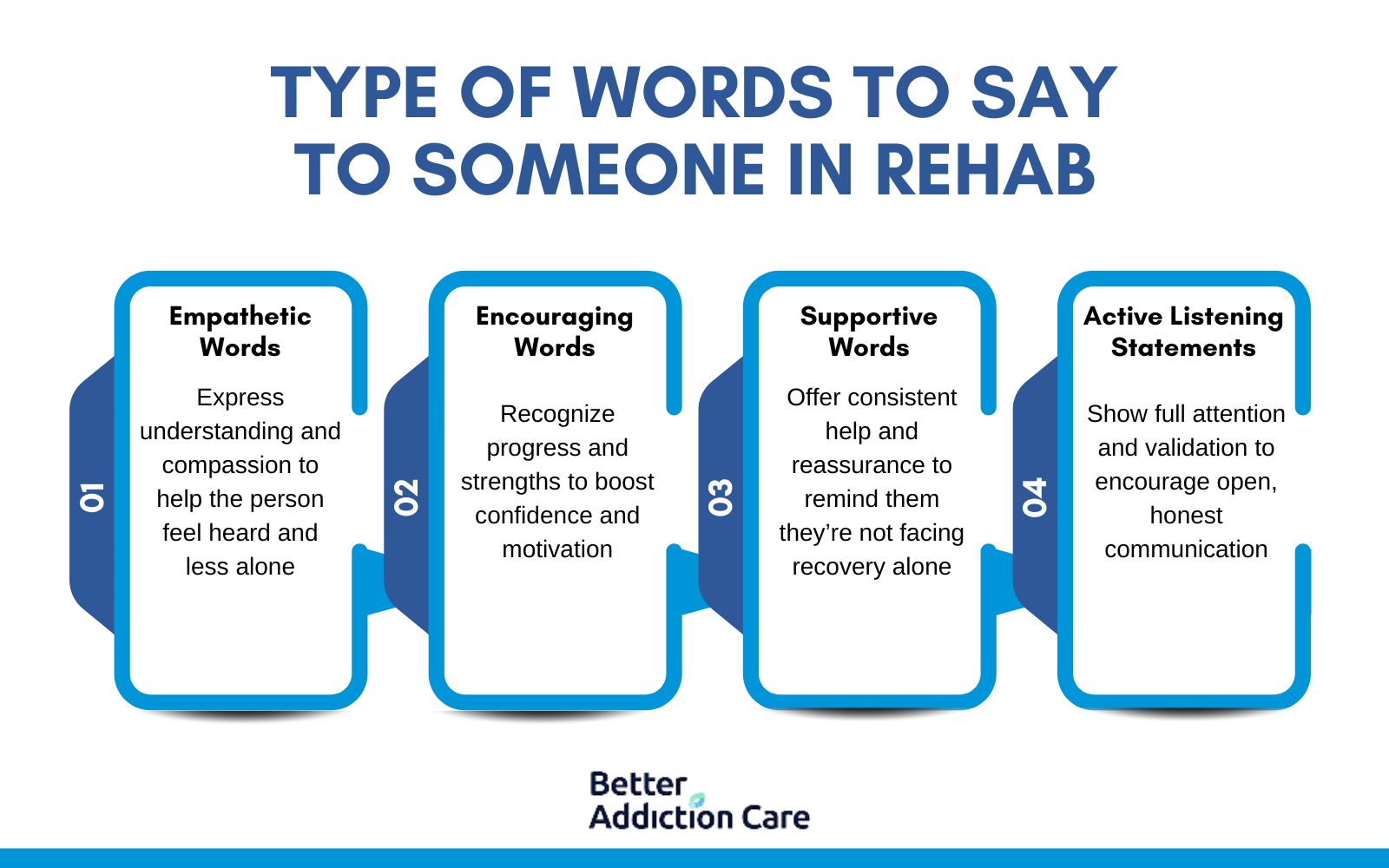
When speaking to someone in rehab, focus on expressing empathy, offering encouragement, providing support, and practicing active listening.Effective communication with individuals in rehabilitation requires compassionate, nonjudgmental language that validates their feelings and experiences.
When speaking to someone in rehab, focus on expressing empathy, offering encouragement, providing support, and practicing active listening.Effective communication with individuals in rehabilitation requires compassionate, nonjudgmental language that validates their feelings and experiences.
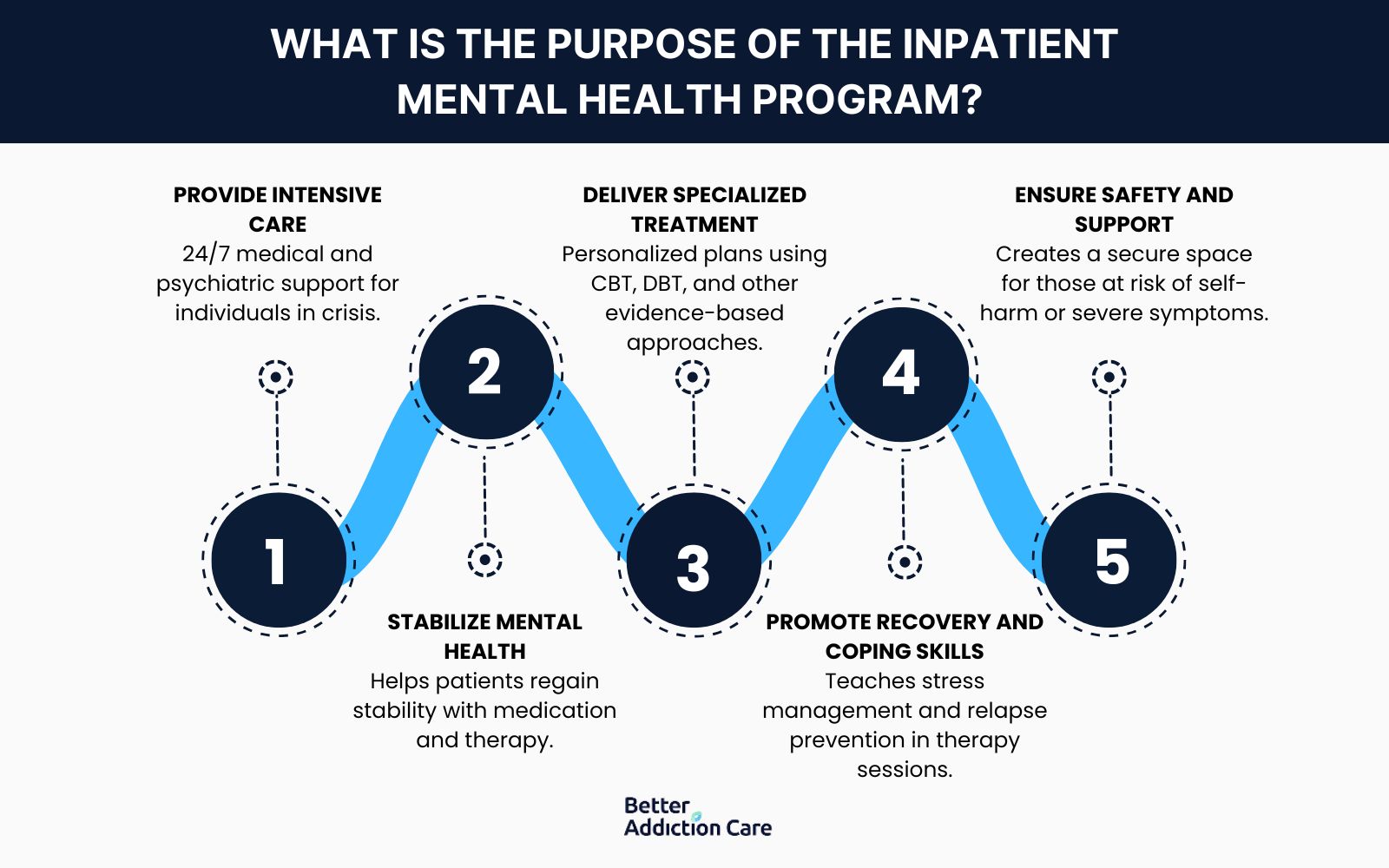
Inpatient mental health programs provide a structured and supportive environment for individuals struggling with severe mental health conditions. These programs offer round-the-clock medical and therapeutic care, ensuring that patients receive intensive support tailored to their needs.
Inpatient mental health programs provide a structured and supportive environment for individuals struggling with severe mental health conditions. These programs offer round-the-clock medical and therapeutic care, ensuring that patients receive intensive support tailored to their needs.
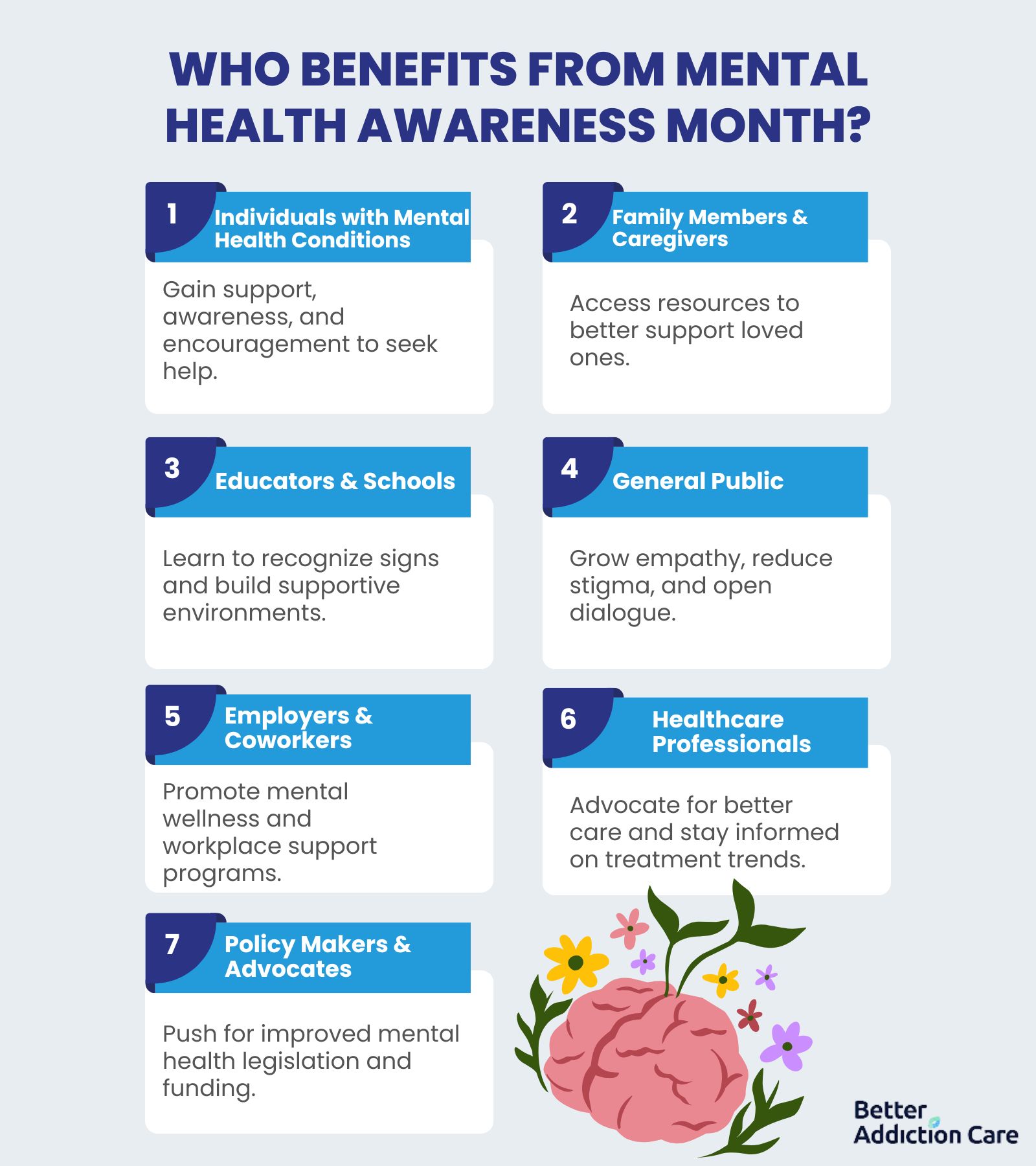
Mental Health Awareness Month is a nationwide observance dedicated to raising awareness surrounding mental health. From anxiety and depression to trauma and co-occurring disorders, Mental Health Awareness Month highlights the broad range of challenges people face and emphasizes that mental health is just as important as physical health.
Mental Health Awareness Month is a nationwide observance dedicated to raising awareness surrounding mental health. From anxiety and depression to trauma and co-occurring disorders, Mental Health Awareness Month highlights the broad range of challenges people face and emphasizes that mental health is just as important as physical health.
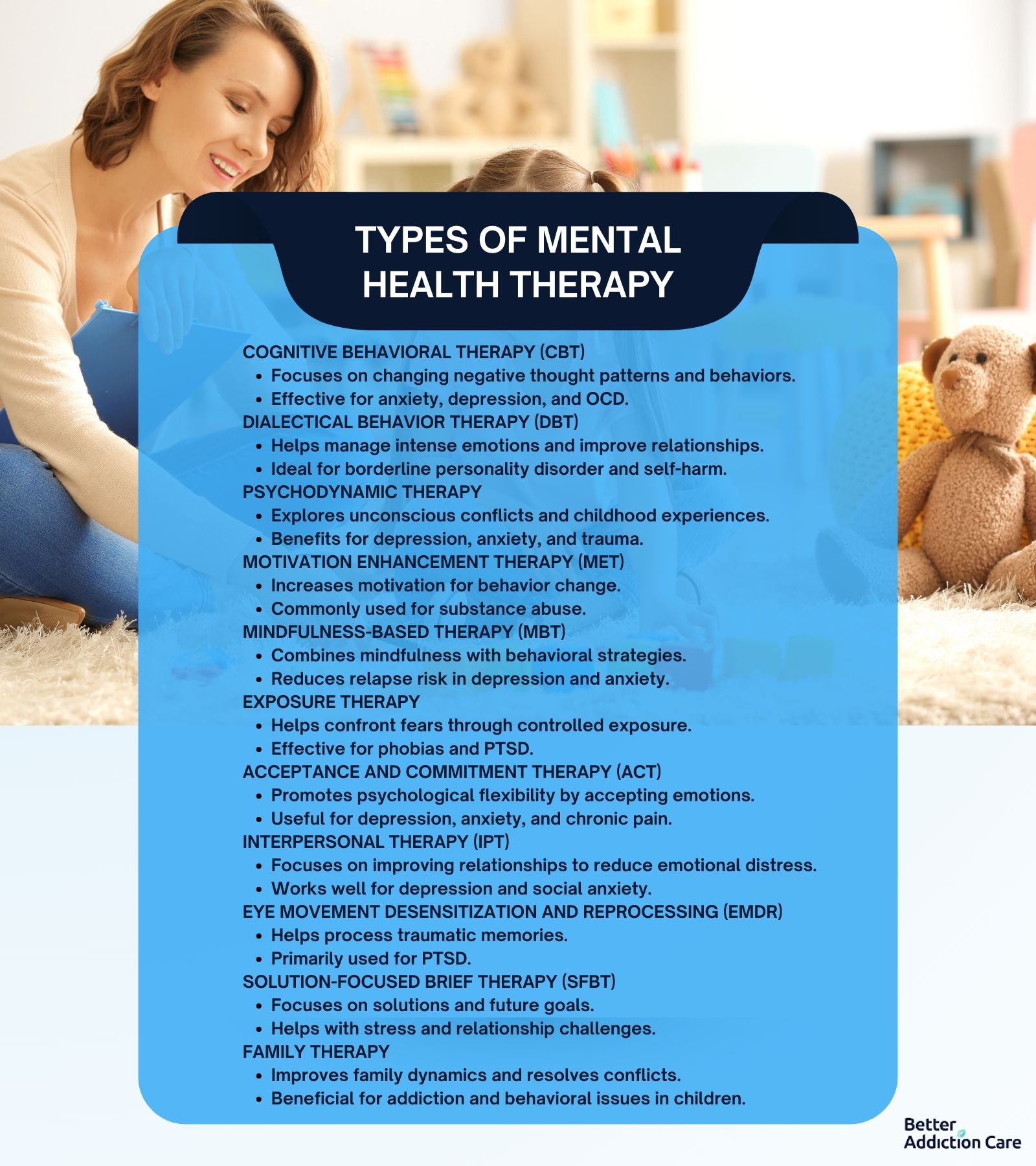
Mental health therapy is a structured treatment approach designed to help individuals manage and overcome psychological and emotional challenges. Therapy is important for addressing mental health disorders such as depression, anxiety, PTSD, and substance use disorders, providing individuals with the tools they need to lead healthier and more fulfilling lives.
Mental health therapy is a structured treatment approach designed to help individuals manage and overcome psychological and emotional challenges. Therapy is important for addressing mental health disorders such as depression, anxiety, PTSD, and substance use disorders, providing individuals with the tools they need to lead healthier and more fulfilling lives.
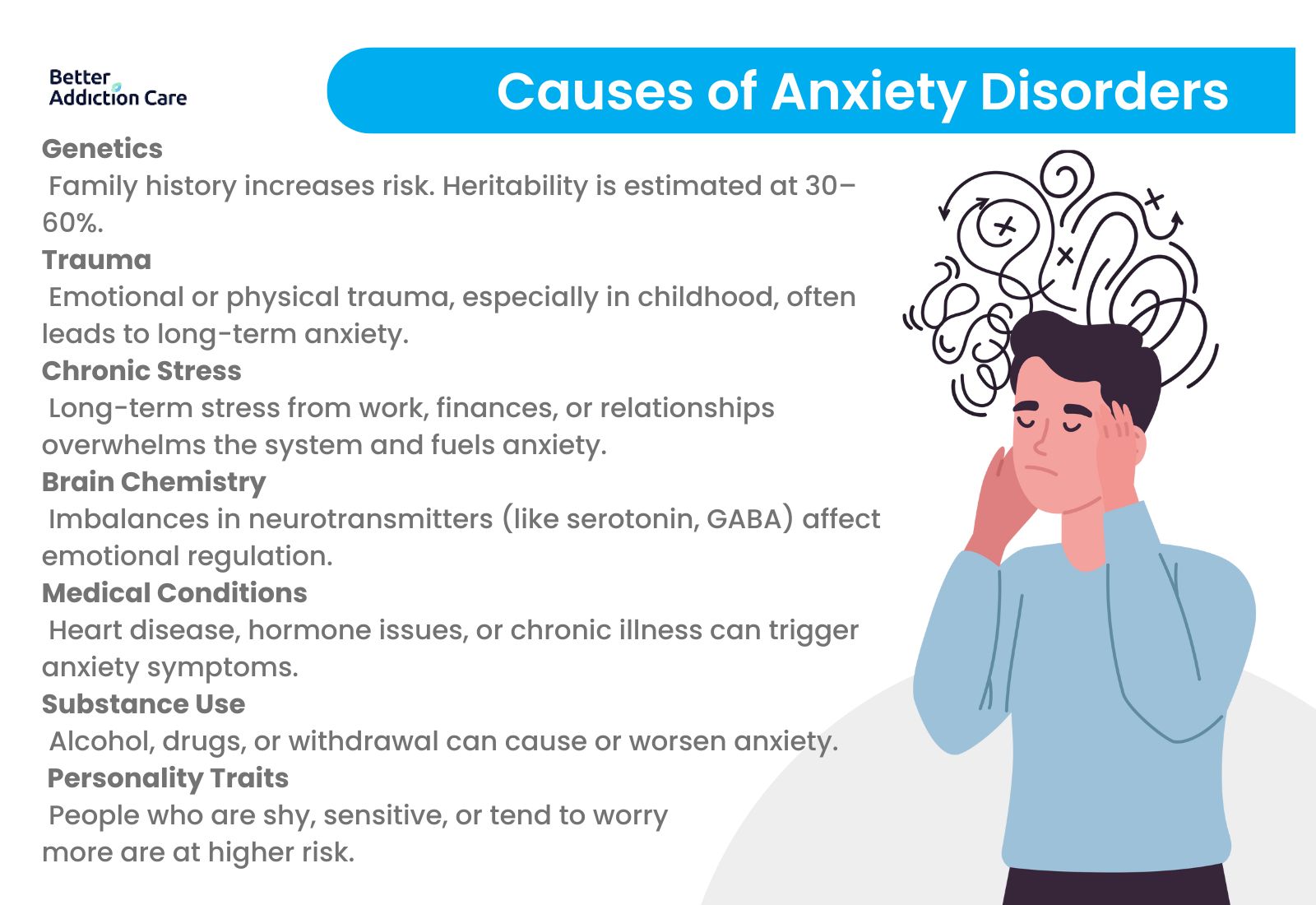
Anxiety disorders are mental health conditions marked by persistent fear, worry, or nervousness that interferes with daily life. Unlike occasional anxiety, these disorders involve intense symptoms that disrupt thinking, emotions, and behavior, making it difficult to function socially and professionally.
Anxiety disorders are mental health conditions marked by persistent fear, worry, or nervousness that interferes with daily life. Unlike occasional anxiety, these disorders involve intense symptoms that disrupt thinking, emotions, and behavior, making it difficult to function socially and professionally.
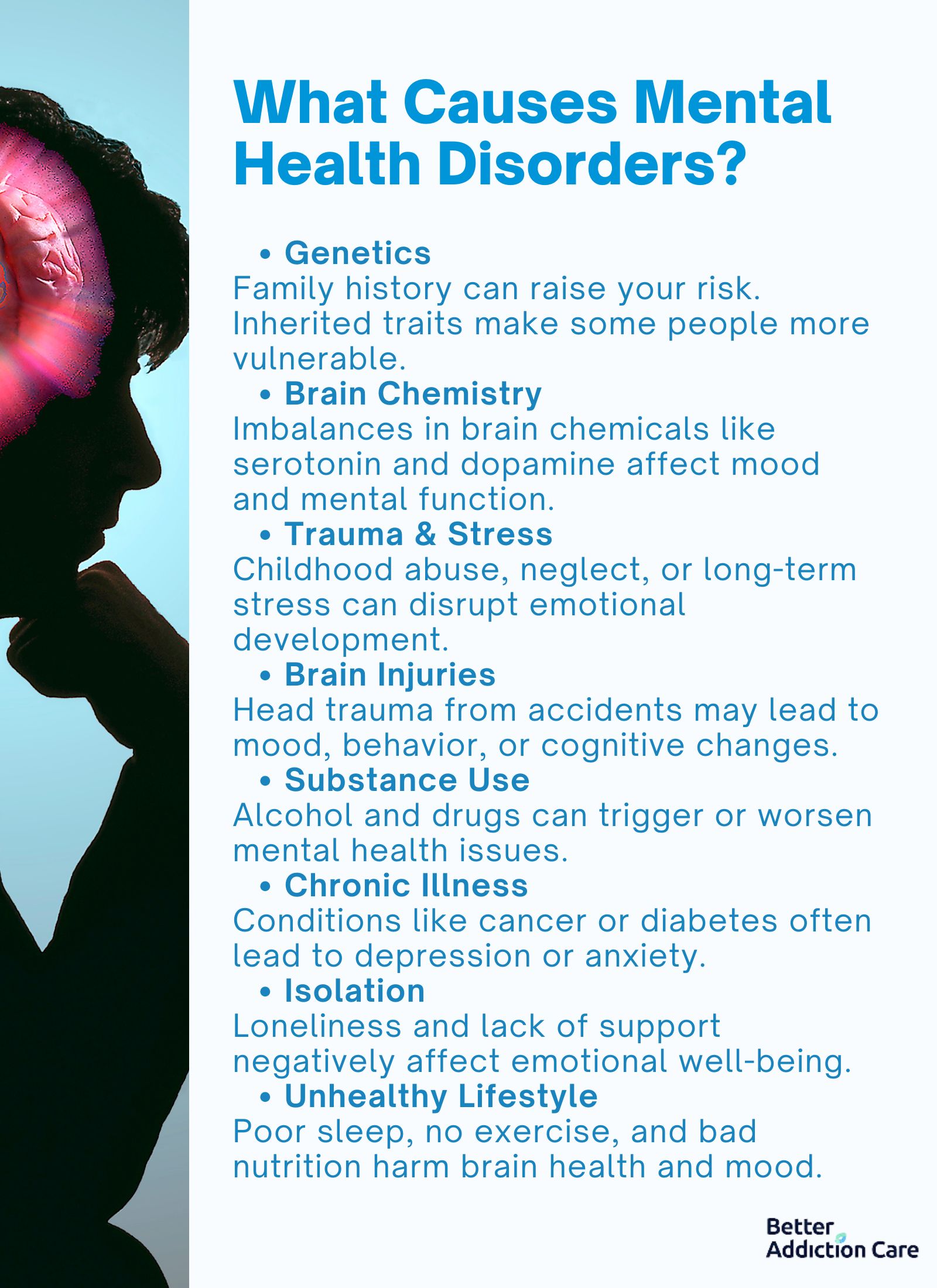
Mental health disorders are medical conditions that interfere with an individual’s emotional, psychological, and social well-being. These disorders impact how people think, feel, and behave, and they limit one’s ability to function effectively in daily life.
Mental health disorders are medical conditions that interfere with an individual’s emotional, psychological, and social well-being. These disorders impact how people think, feel, and behave, and they limit one’s ability to function effectively in daily life.

Alcohol intervention is a structured approach designed to confront and assist individuals exhibiting harmful drinking behaviors, with the goal of guiding them toward professional treatment. According to the National Institute on Alcohol Abuse and Alcoholism (NIAAA), nearly 29.
Alcohol intervention is a structured approach designed to confront and assist individuals exhibiting harmful drinking behaviors, with the goal of guiding them toward professional treatment. According to the National Institute on Alcohol Abuse and Alcoholism (NIAAA), nearly 29.
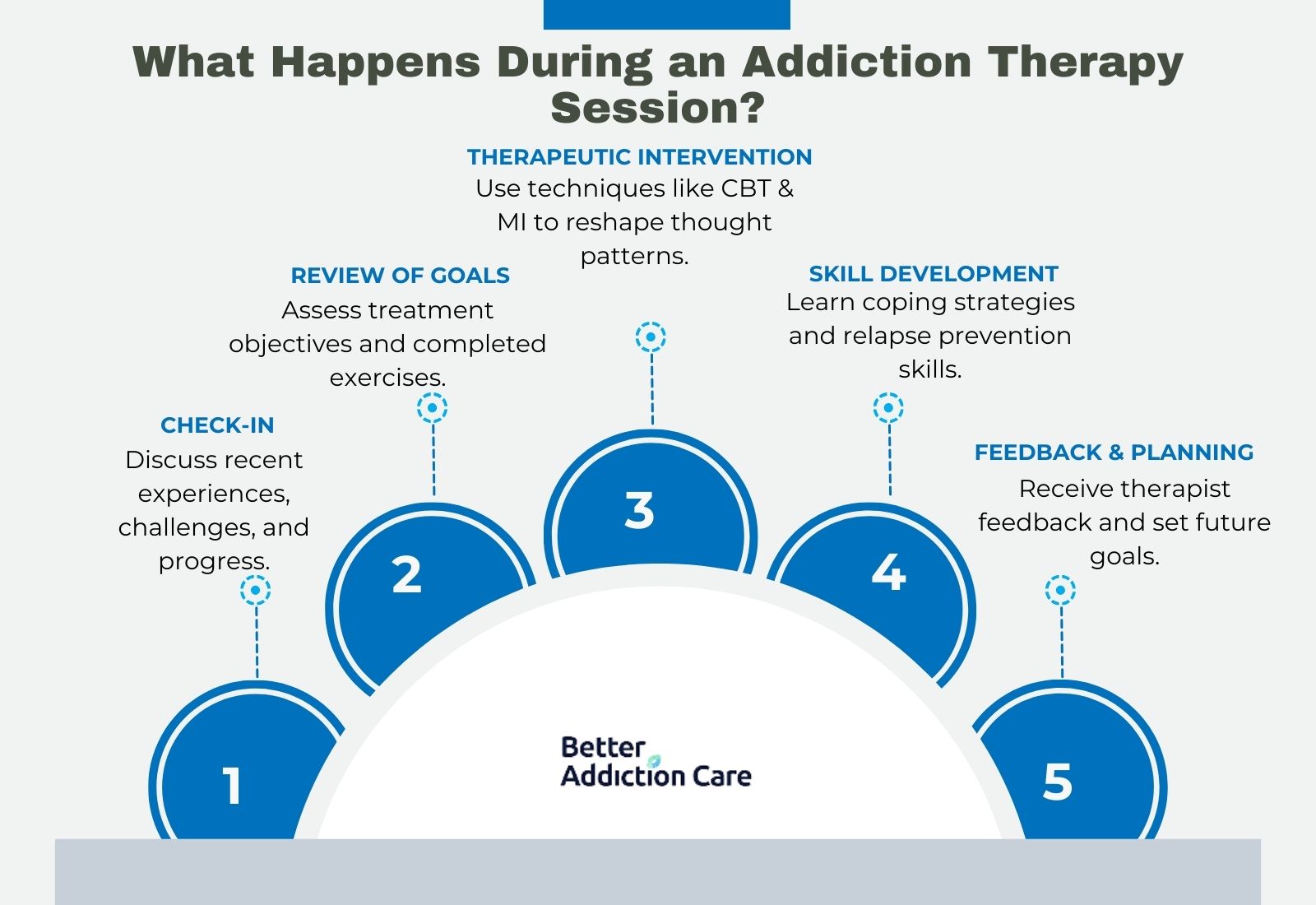
Addiction therapy is a structured form of treatment designed to help individuals overcome substance use disorders by addressing the psychological, emotional, and behavioral aspects of addiction. It involves evidence-based interventions that guide individuals through recovery, improve mental health, and reduce the risk of relapse.
Addiction therapy is a structured form of treatment designed to help individuals overcome substance use disorders by addressing the psychological, emotional, and behavioral aspects of addiction. It involves evidence-based interventions that guide individuals through recovery, improve mental health, and reduce the risk of relapse.
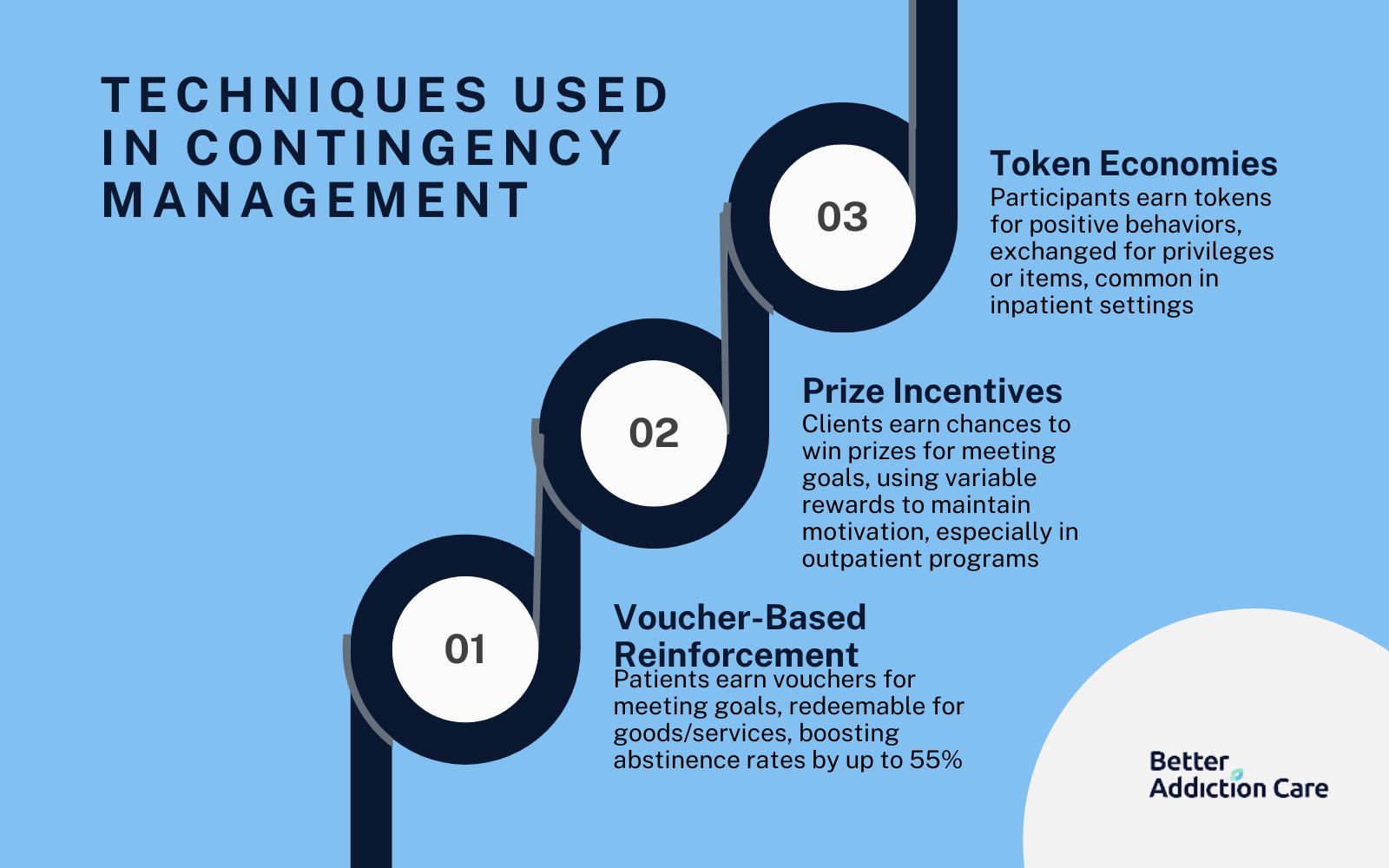
Contingency management (CM) uses operant conditioning and reinforcement techniques to encourage positive behavioral changes, such as abstinence or treatment adherence. According to a study by Higgins et al.
Contingency management (CM) uses operant conditioning and reinforcement techniques to encourage positive behavioral changes, such as abstinence or treatment adherence. According to a study by Higgins et al.
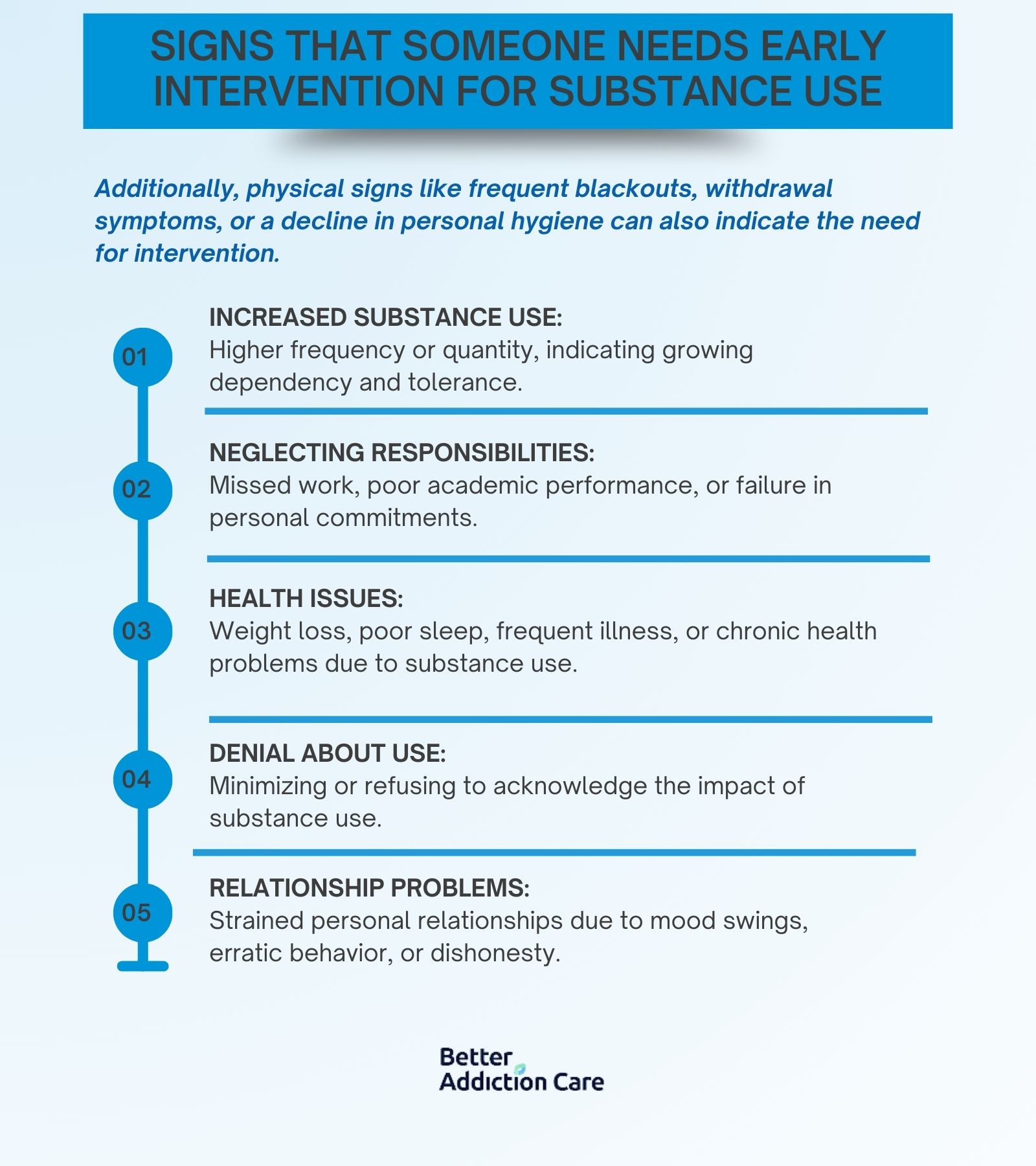
Early intervention refers to the process of identifying and addressing substance use behaviors before they escalate into full addiction, using preventive strategies such as counseling, education, and behavioral therapy.
Early intervention refers to the process of identifying and addressing substance use behaviors before they escalate into full addiction, using preventive strategies such as counseling, education, and behavioral therapy.
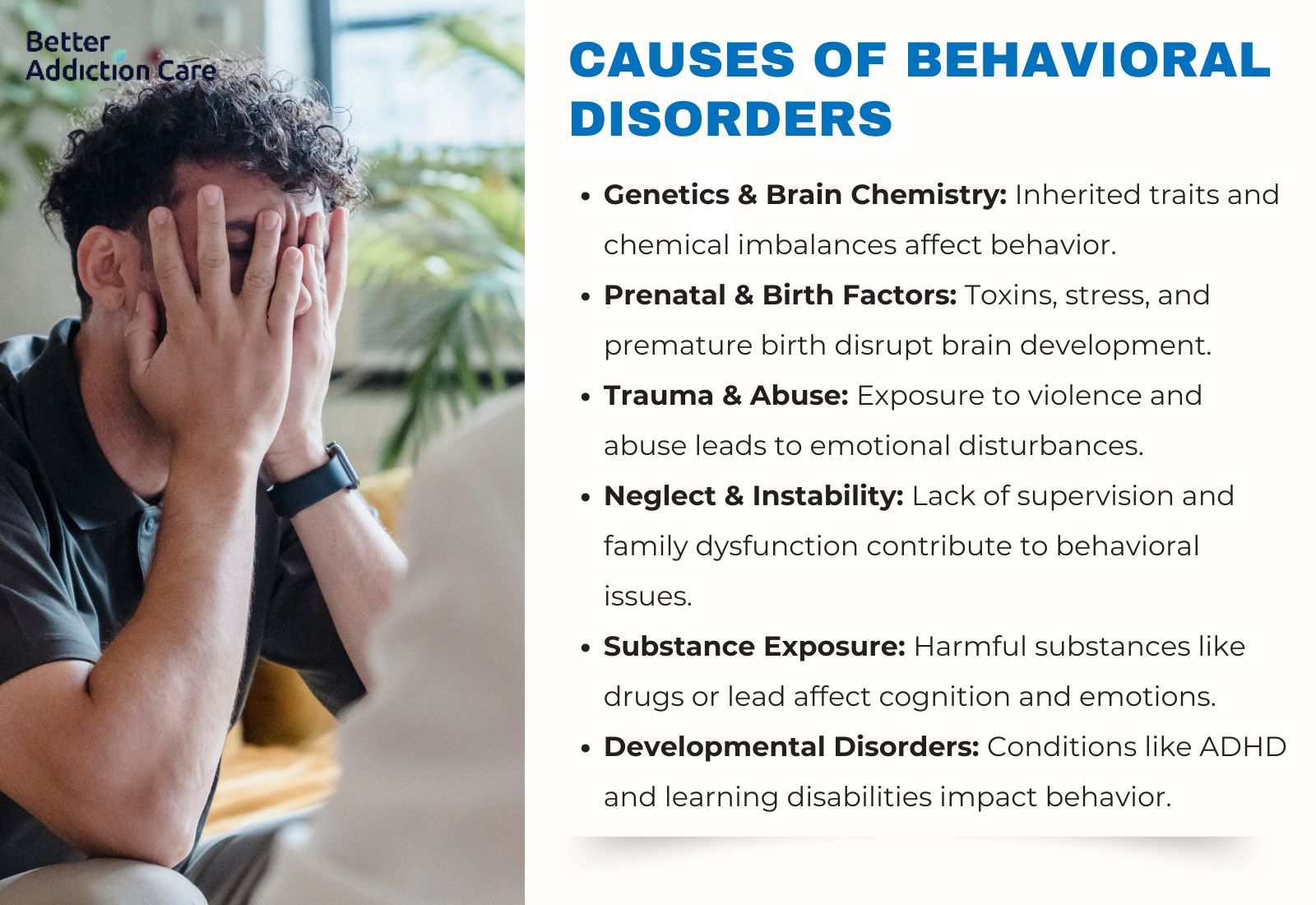
Behavioral disorders are serious conditions that disrupt a person’s ability to manage emotions, behaviors, and relationships in daily life. These patterns of disruptive behavior go beyond occasional misbehavior and significantly impact social, academic, and occupational functioning.
Behavioral disorders are serious conditions that disrupt a person’s ability to manage emotions, behaviors, and relationships in daily life. These patterns of disruptive behavior go beyond occasional misbehavior and significantly impact social, academic, and occupational functioning.
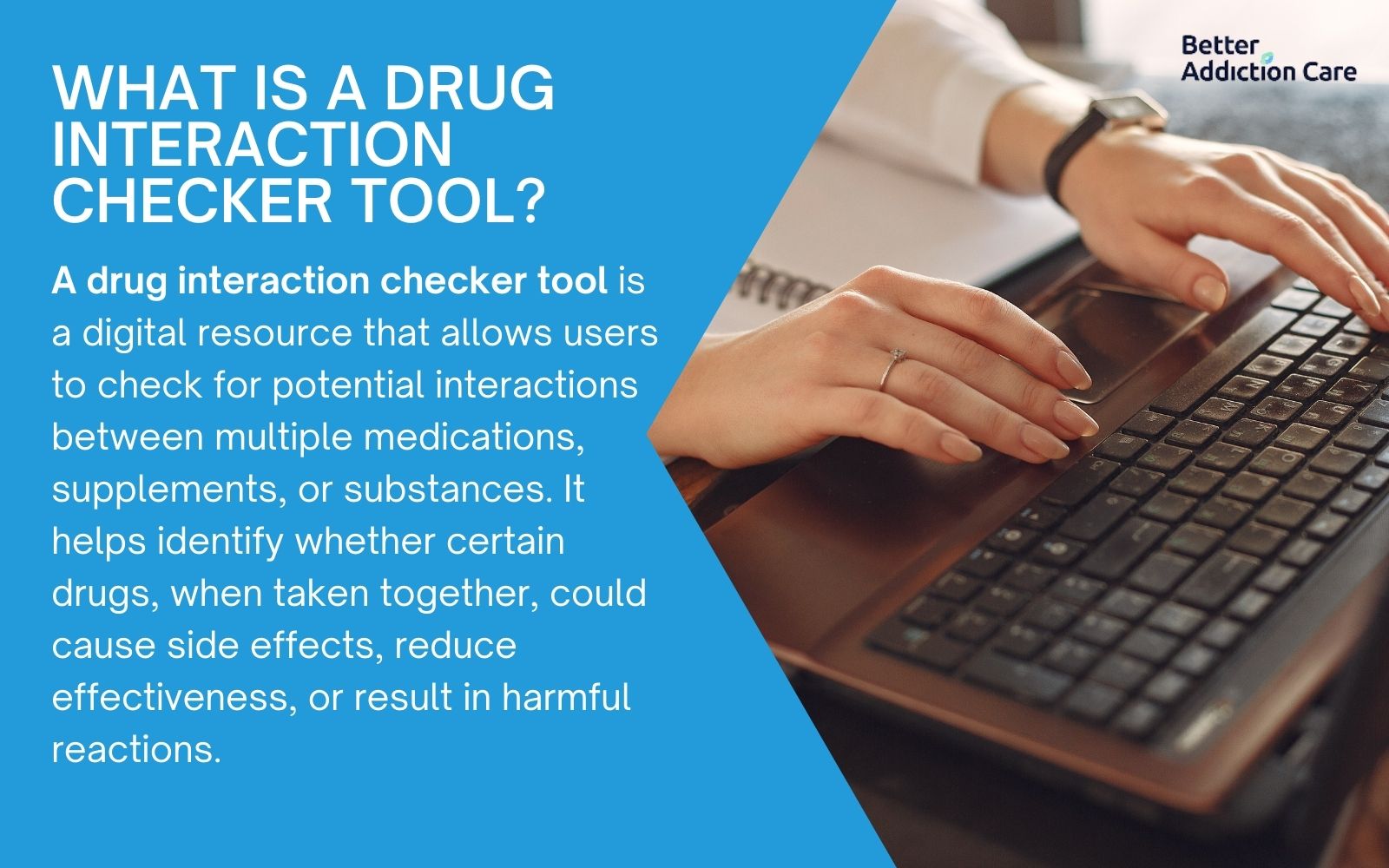
A drug interaction checker is a digital or software-based tool designed to identify potential interactions between two or more medications. These tools are commonly used by healthcare professionals, pharmacists, and patients to improve medication safety by detecting combinations that could lead to adverse effects, reduced effectiveness, or dangerous health outcomes.
A drug interaction checker is a digital or software-based tool designed to identify potential interactions between two or more medications. These tools are commonly used by healthcare professionals, pharmacists, and patients to improve medication safety by detecting combinations that could lead to adverse effects, reduced effectiveness, or dangerous health outcomes.
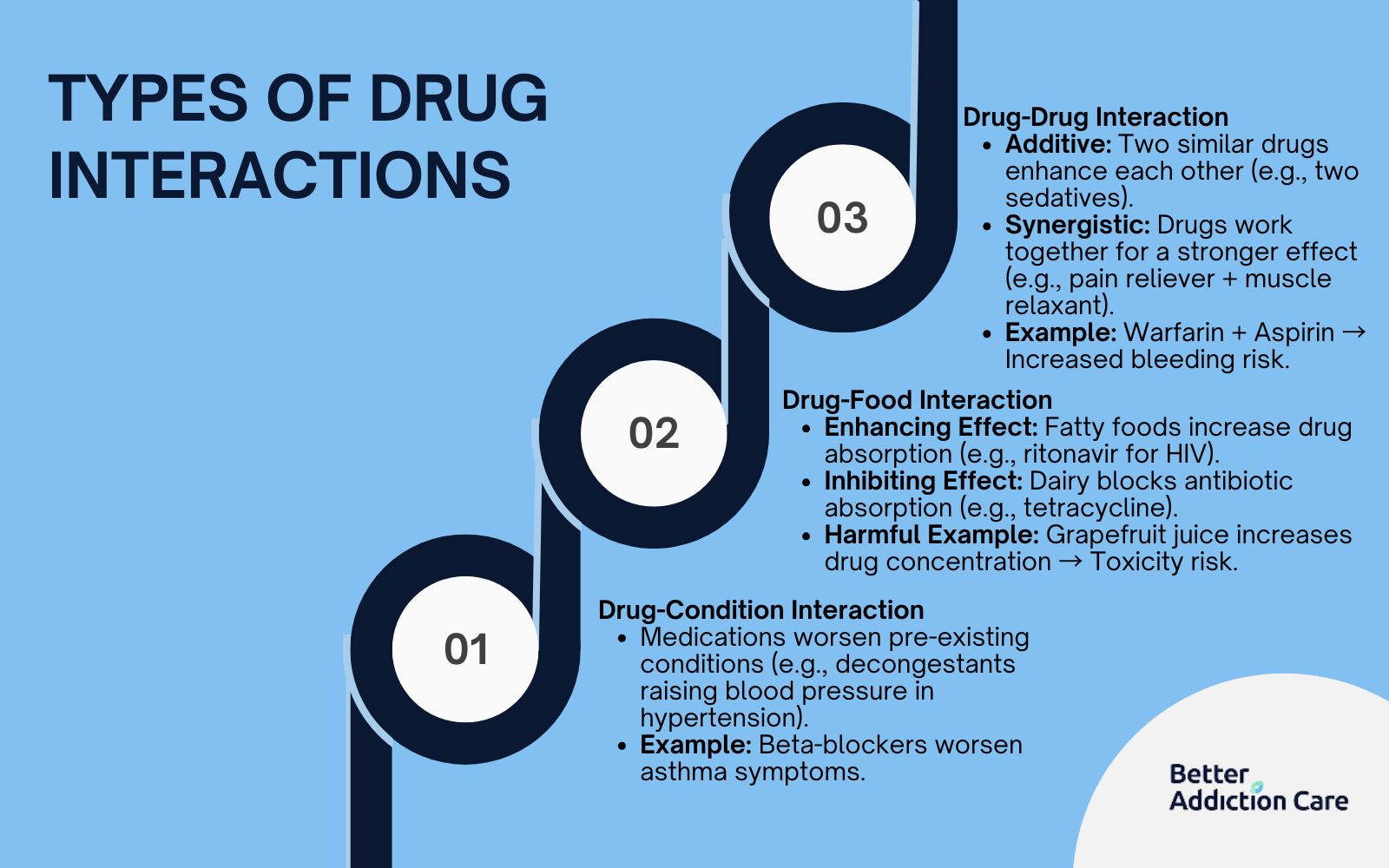
Drug interactions occur when one drug affects the way another drug works, potentially altering its effectiveness or increasing the risk of side effects. These interactions involve prescription medications, over-the-counter drugs, supplements, or even certain foods and beverages, making awareness necessary for safe medication use.
Drug interactions occur when one drug affects the way another drug works, potentially altering its effectiveness or increasing the risk of side effects. These interactions involve prescription medications, over-the-counter drugs, supplements, or even certain foods and beverages, making awareness necessary for safe medication use.
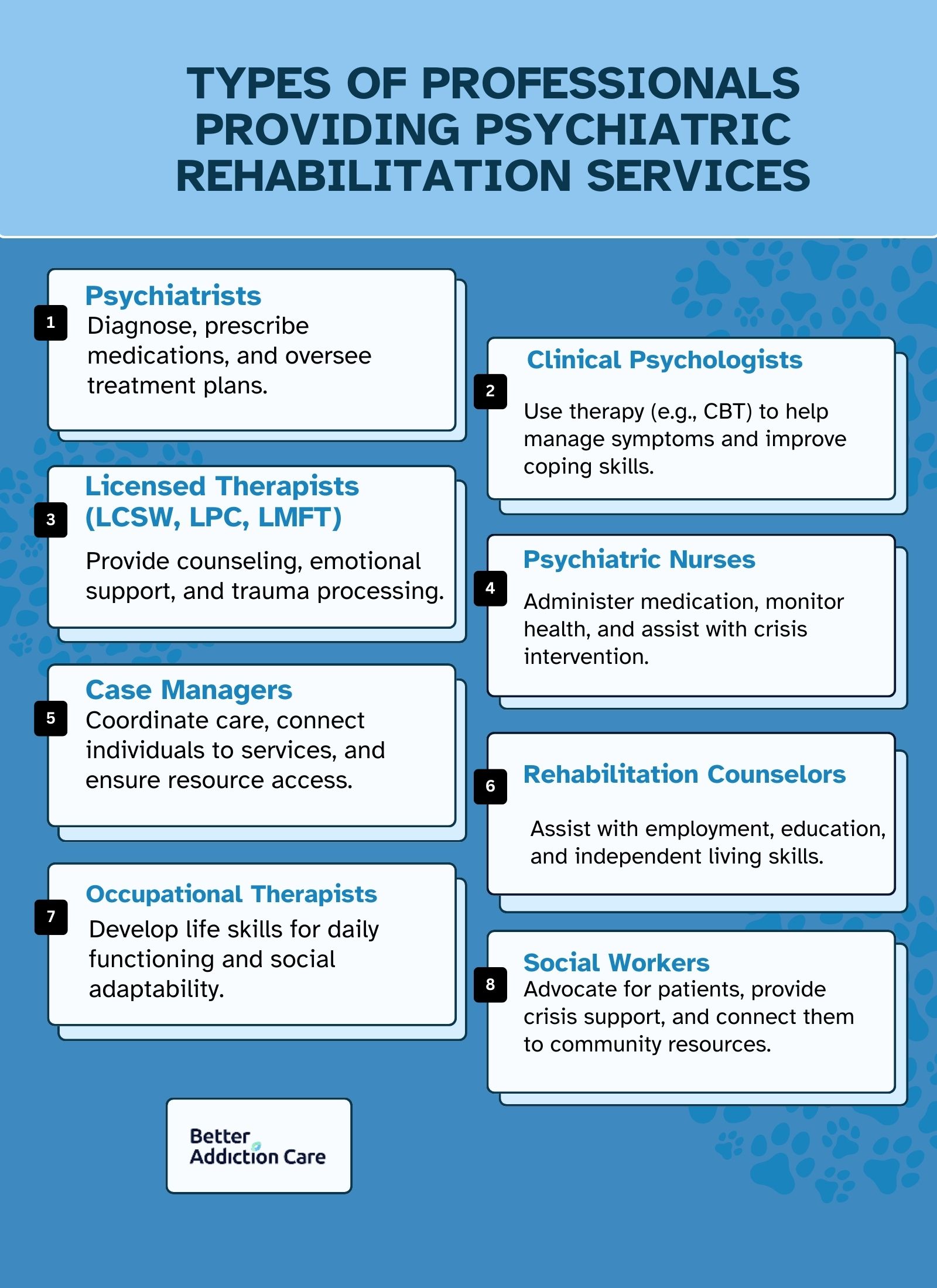
Psychiatric rehabilitation helps individuals with severe mental health conditions regain independence, develop coping skills, and reintegrate into society. Psychiatric rehabilitation focuses on improving emotional, social, and vocational functioning through structured interventions, combining therapy, medication management, and life skills training to enhance overall well-being.
Psychiatric rehabilitation helps individuals with severe mental health conditions regain independence, develop coping skills, and reintegrate into society. Psychiatric rehabilitation focuses on improving emotional, social, and vocational functioning through structured interventions, combining therapy, medication management, and life skills training to enhance overall well-being.
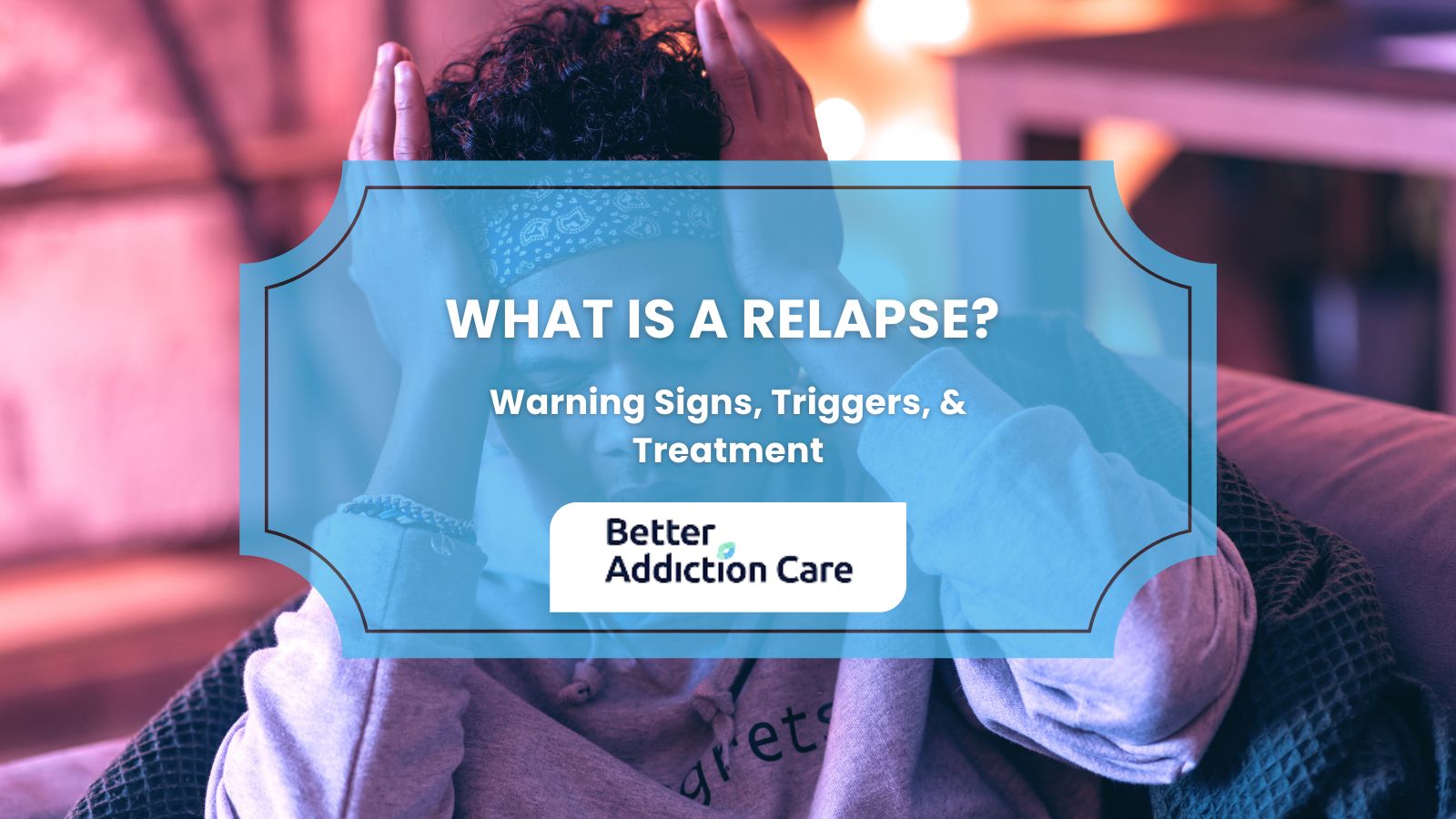
A relapse is the return of addiction, illness or problematic behaviors after a period of recovery, indicating a setback in an individual's condition, often seen in chronic diseases, addiction, or psychiatric disorders.
A relapse is the return of addiction, illness or problematic behaviors after a period of recovery, indicating a setback in an individual's condition, often seen in chronic diseases, addiction, or psychiatric disorders.
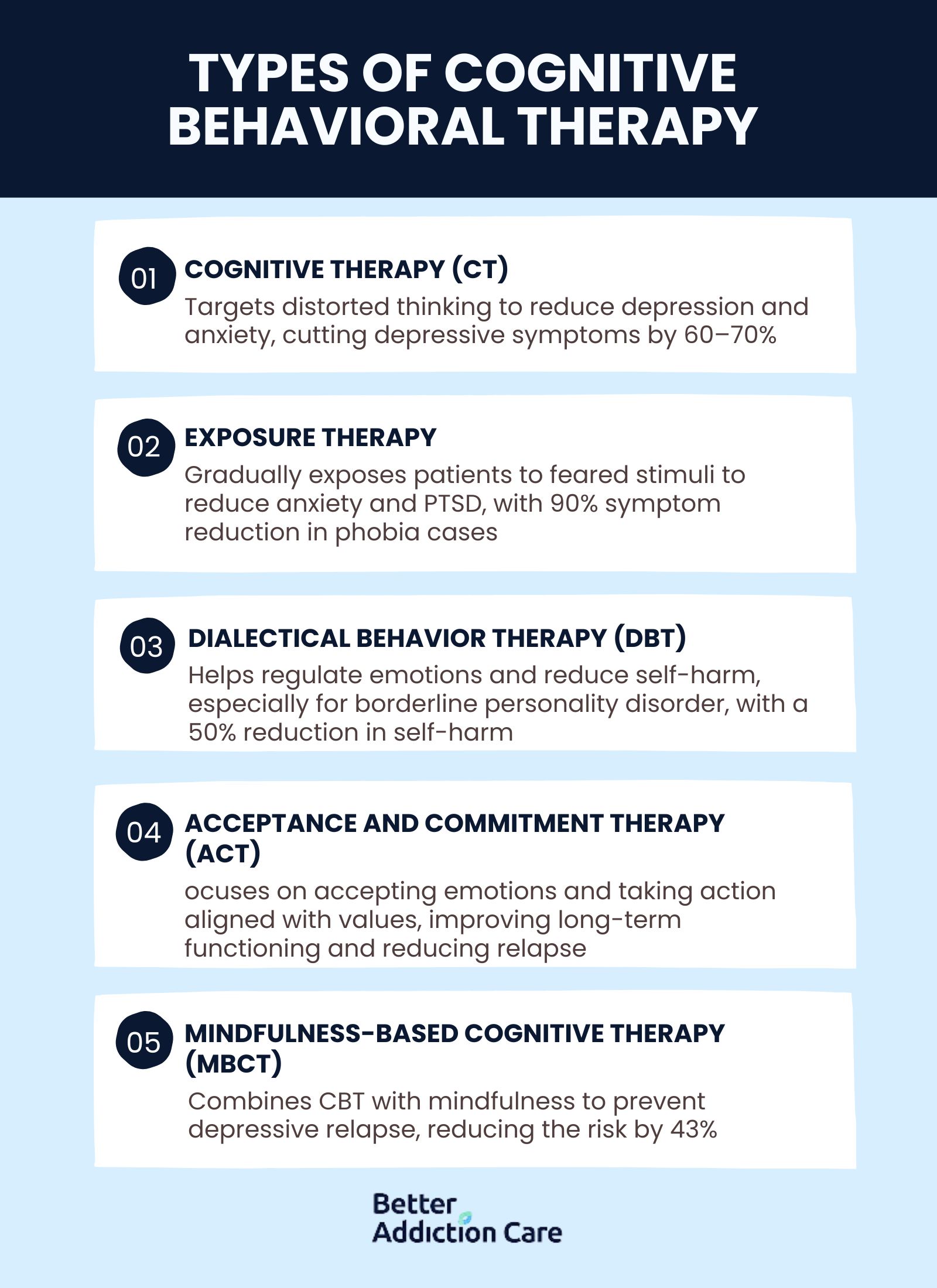
Cognitive Behavioral Therapy (CBT) focuses on identifying and modifying the thought patterns and behaviors that lead to and sustain addictive behavior. It emphasizes active participation, practical skill development, and consistent practice through a structured form of therapy led by trained therapists.
Cognitive Behavioral Therapy (CBT) focuses on identifying and modifying the thought patterns and behaviors that lead to and sustain addictive behavior. It emphasizes active participation, practical skill development, and consistent practice through a structured form of therapy led by trained therapists.
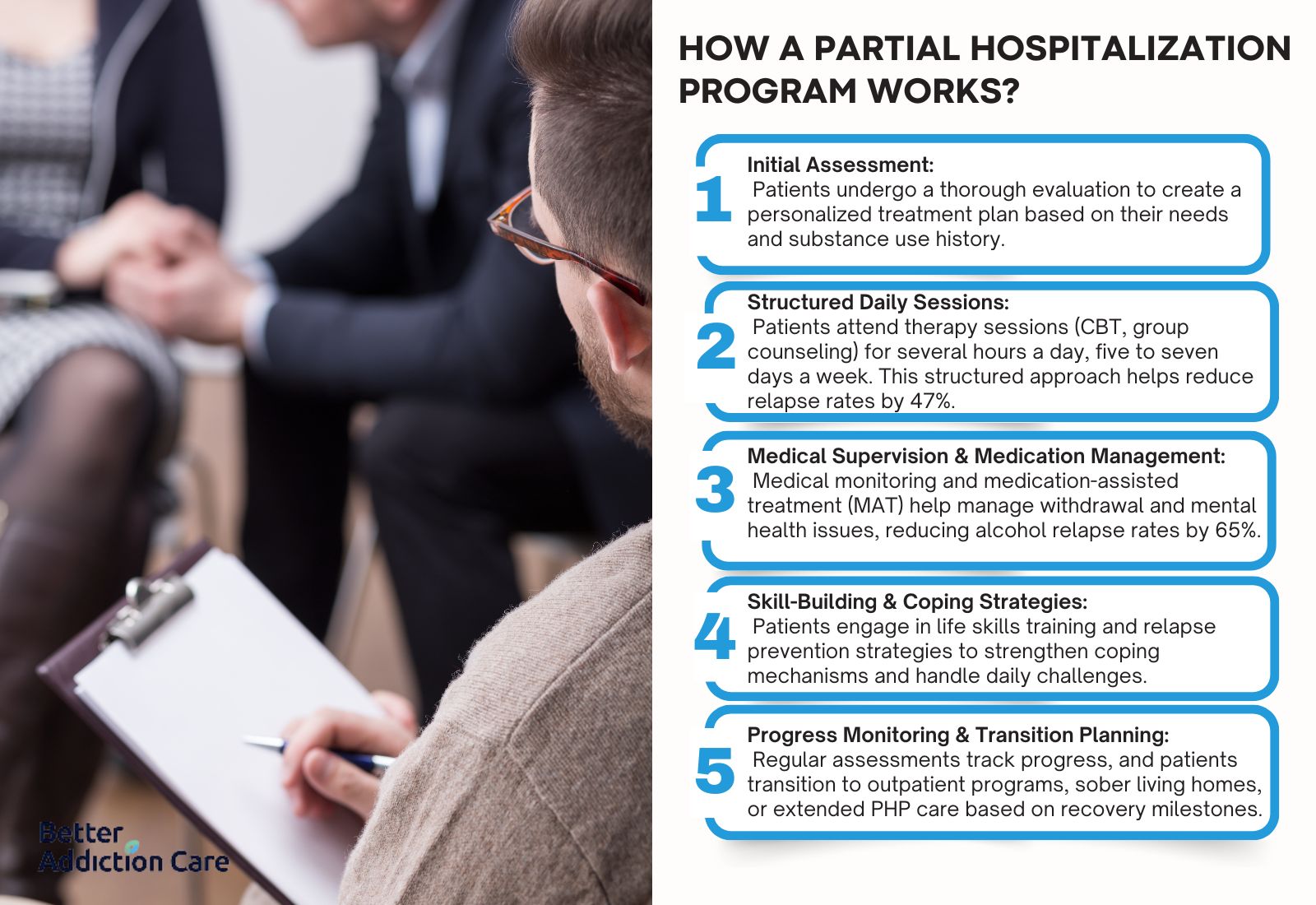
Partial Hospitalization Programs (PHP) provide structured therapy, medical supervision, and relapse prevention while allowing individuals to live at home. According to a study by the National Institute on Drug Abuse (NIDA) 2022, individuals in PHPs have a 54% higher treatment retention rate compared to those in standard outpatient programs.
Partial Hospitalization Programs (PHP) provide structured therapy, medical supervision, and relapse prevention while allowing individuals to live at home. According to a study by the National Institute on Drug Abuse (NIDA) 2022, individuals in PHPs have a 54% higher treatment retention rate compared to those in standard outpatient programs.
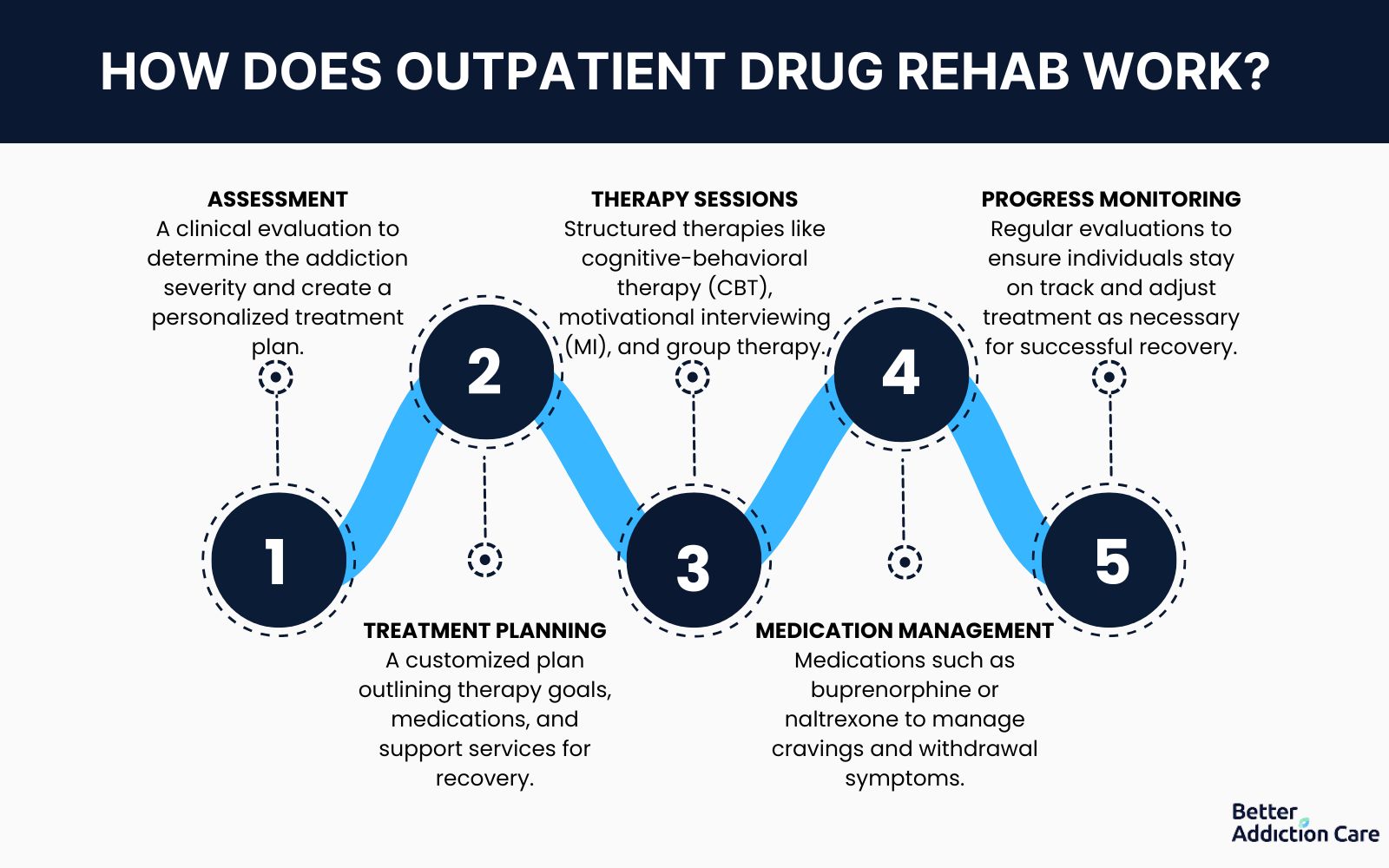
Outpatient alcohol rehab provides structured treatment for alcohol addiction while allowing individuals to live at home. This approach is important in recovery because it offers flexibility for people with work, family, or school commitments while still providing essential therapy and support.
Outpatient alcohol rehab provides structured treatment for alcohol addiction while allowing individuals to live at home. This approach is important in recovery because it offers flexibility for people with work, family, or school commitments while still providing essential therapy and support.
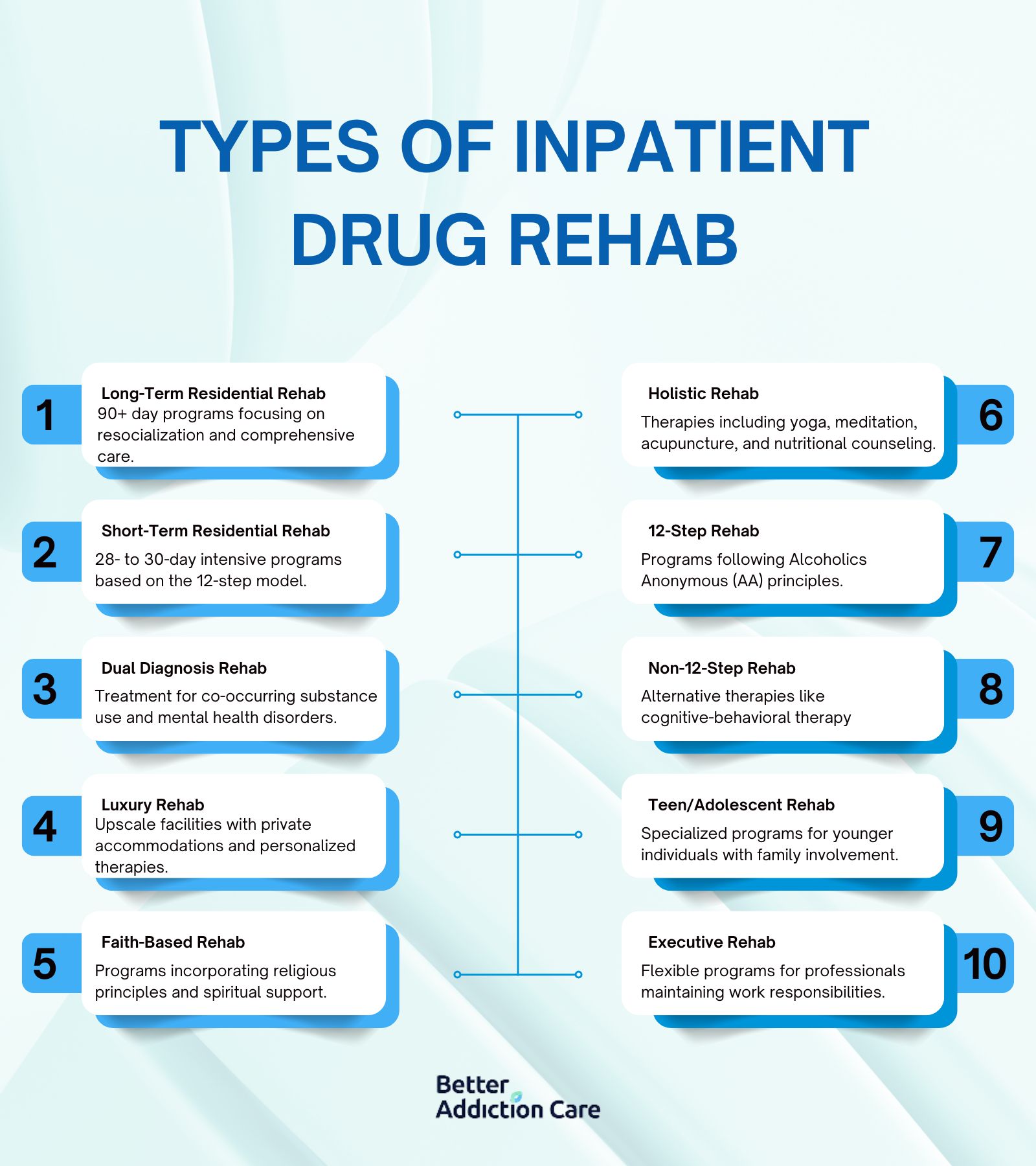
Inpatient drug rehab is an addiction treatment program where individuals stay at a facility to receive intensive care. The purpose of inpatient drug rehab is to provide a controlled environment that removes individuals from triggers, helping them focus on recovery.
Inpatient drug rehab is an addiction treatment program where individuals stay at a facility to receive intensive care. The purpose of inpatient drug rehab is to provide a controlled environment that removes individuals from triggers, helping them focus on recovery.
